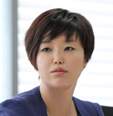[Arirang TV] 2014-07-12
The events in Egypt over the last two weeks have been equal parts fascinating and bewildering.
Most of us don’t quite know what to make of what is happening there.
Was Mohammed Morsy, the country’s first freely elected president, overthrown in a military coup?
Or did the army protect the country’s fledgling democratic system by removing an increasingly autocratic head of state who refused to share power?
Joining us live to provide us with some insights is Dr. Jang Ji-hyang, Director of the Middle East and North Africa Center at the Asan Institute for Policy Studies.
Welcome to the program, Dr. Jang.
Happy to be here.
When long-serving President Hosni Mubarak was toppled from power two-and-a-half years ago, the rest of the world thought it was the end of a revolution.
When Mohammed Morsy became the president, we thought Egypt was on the right path to democracy.
So what went wrong?
So, this is a clash between the Muslim Brotherhood and the country’s military.
I think we need a clear understanding of what this Muslim Brotherhood is, exactly?
Egypt’s military has announced a new timeline which consists of new presidential and parliamentary elections. The Muslim Brotherhood and Morsy’s allies have said they won’t participate. Just how realistic is the timeline, and do you see it going as planned?
There are observers who say what is happening in Egypt now is the fall of what is known as “political Islam.”
What is this concept and what do they mean by this?
Let’s talk about U.S. involvement – or lackthereof – in this case.
Washington, to the chagrin of some Egyptians and Americans, has gone out of its way to avoid calling the Egyptian military’s July 2nd overthrow of President Mohammed Morsy a “coup.” What’s behind such behavior by the U.S.?
How do you think the current unrest in Egypt will impact neighboring countries such as Tunisia and Libya that are part of this “Arab Spring” movement?
Dr. Jang Ji-hyang, Director of the Middle East and North Africa Center at the Asan Institute for Policy Studies, thank you so much for your valuable insights this evening. We appreciate it.
Reporter : jenmoon@arirang.co.kr

 Facebook
Facebook Twitter
Twitter